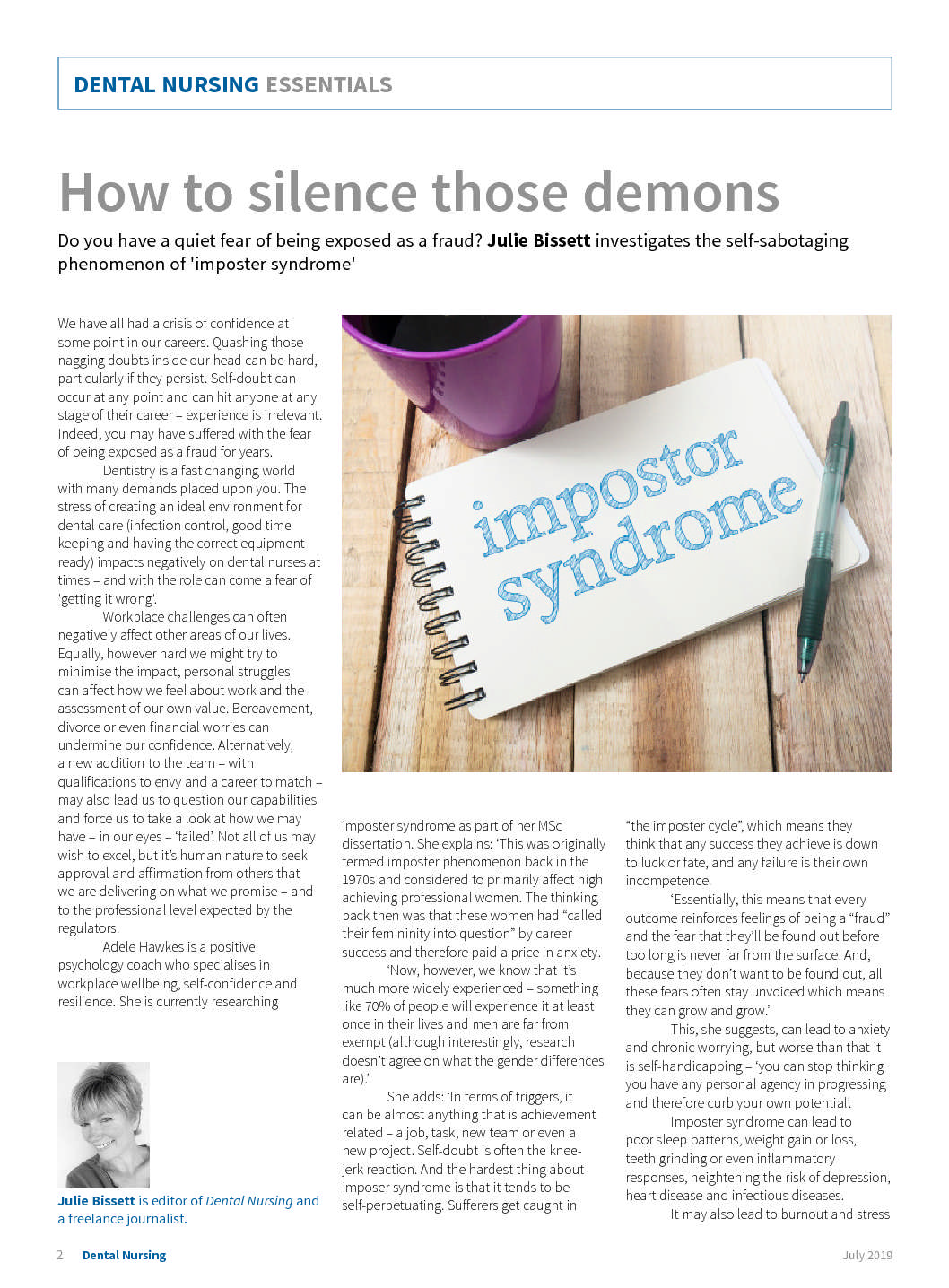Imposter syndrome is absolutely fascinating to me – so fascinating that it’s the subject of my MSc research dissertation.
Positive psychology and coaching offer huge potential for helping curb feelings of being undeserving of your success, and developing the authenticity and self-awareness needed to keep any unfounded self-doubt triggers at bay. Through my MSc, I’m really excited to be able to add to the existing research on imposter syndrome in some small way.
The first step is actually talking about how you’re feeling so I was absolutely delighted to be asked to contribute to an article in Dental Nursing recently. Read below for my five top tips on overcoming this too-common phenomenon.
- Don’t believe everything you think!
One of the most effective ways of stopping imposter syndrome in its tracks is simply being aware that the feelings of self-doubt you are experiencing have absolutely no bearing on your competence to do the job. Emotions are data, not decisions. When feelings of faking it come up, question your thoughts – what evidence do you have to think this way? What has past experience taught you? When you’ve started off without the skills to complete a task, how have you adapted and coped?
2. Share how you feel
An interesting quirk about coaching people with IS is that it’s rarely the reason they seek coaching in the first place. It tends to surface around session two or three. Funnily enough, this was also noted when IP was first identified back in the 1970s –people took several psychotherapy sessions to admit to feeling like an imposter as they were convinced firstly that these feelings were unique to them and secondly, that nothing could be done. Neither of these are true! So speak up – to a trusted friend, family member or colleague, or to a coach or mentor. You’ll soon discover you are not alone and that there is plenty you can do to turn down an overly critical inner narrative.
3. Keep a record of positive feedback
One of the traits of IS is that you get very good at rejecting anything that doesn’t tally with this view of yourself as unworthy and a fake. Dismissing positive feedback is a case in point i.e. ‘My boss says I’ve done a good job – little does she know that I was winging it and just managed to get away with it this time!’ To break this habit, start keeping a written record of positive comments that you receive from different people. Then, instead of brushing things off, experiment with taking a few minutes each day to savour and internalise these comments. It might be uncomfortable to begin with, but it can be very powerful in helping you take some ownership of your successes.
4. Think about progress, not perfection
A common thinking trap for those with IS is the idea of ‘perfection with ease’. In practice this reveals itself as setting unreasonably high goals, and then beating yourself up as a failure if you don’t meet them quickly, easily and without much effort. After a while, this negative spiral can prevent you trying to achieve all you could if you simply factored in a little self-compassion. Try to think about yourself as a ‘person-in-process’ instead. It’s ok if you don’t know how to do things perfectly straightaway; it’s ok to pick things up as you go along; it’s ok to get things wrong and learn from your mistakes.
5. Accept your strengths and your flaws
The most long-lasting ‘solution’ to IS is to build a much more realistic picture of your strengths and accept that you also have flaws – we all do! With IS, people tend to focus almost exclusively on the negative, so it’s time to shift your thinking not only to the positive things about you, but also about how you can leverage these strengths to help you tackle more challenging times, tasks and thoughts. Start by listing your strengths, then think in-depth about how you can use them on an everyday basis. If you find this hard, you can try a free strengths survey such as http://www.viacharacter.org, which will give you an objective overview.


